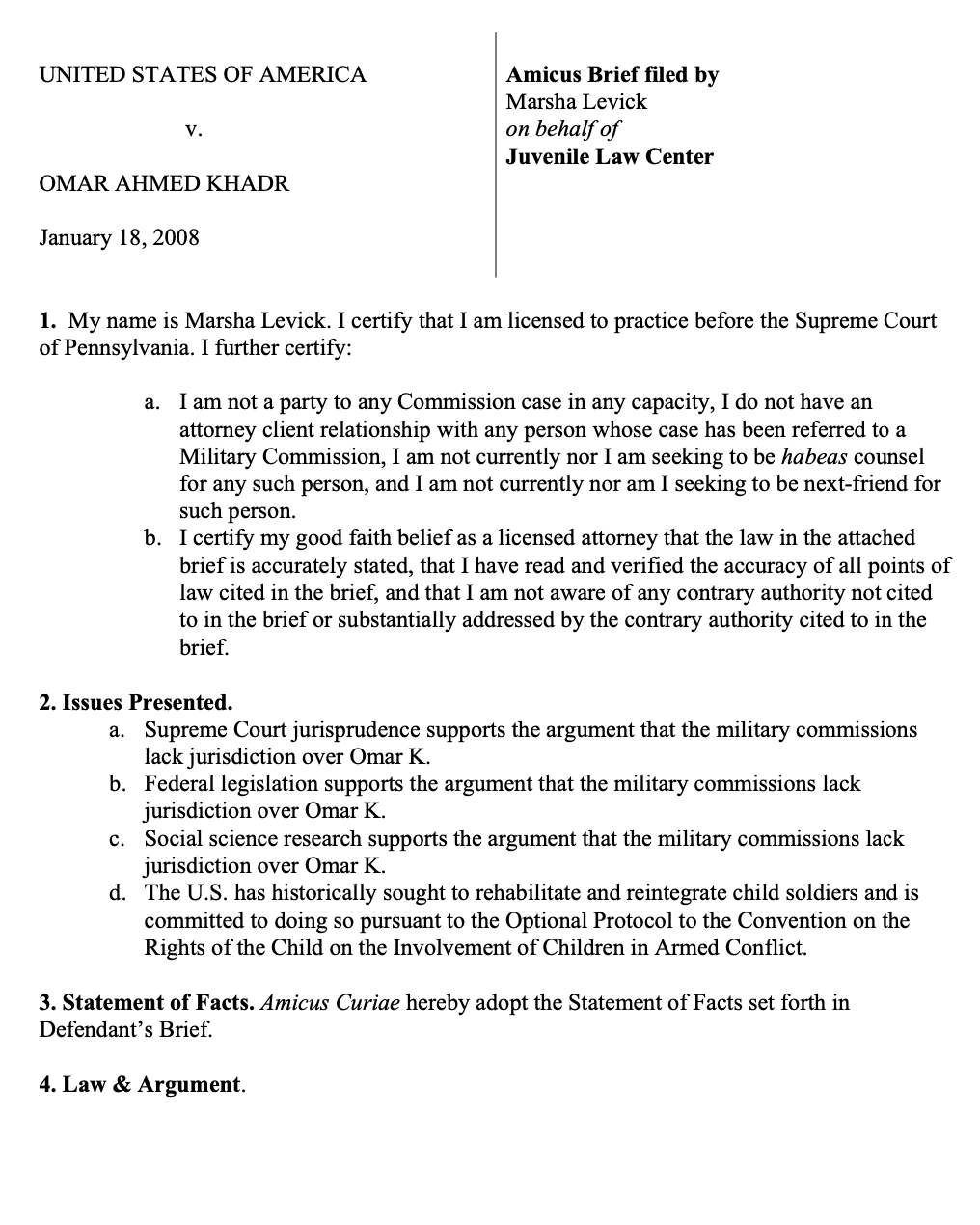
Summary of Argument
Amicus supports Defendant Omar K.’s argument that military commissions convened pursant to the Military Commissions Act (MCA) lack jurisdiction over Omar K. The MCA is silent as to the issue of personal jurisdiction over minors and the military commissions do not provide for a distinct process for juveniles. It would be untenable to impute personal jurisdiction into a silent statute particularly when, in every state in the nation, juvenile offenders are submitted to adult prosecution only by express authorization.1 To impute jurisdiction where there is silence would be comparable to states transferring a juvenile from juvenile court to adult court in the absence of a legislative directive to do so. All 50 states, plus the District of Columbia affirmatively declare the parameters in which a juvenile may be, or in some cases must be transferred to adult court. No state would arbitrarily transfer a juvenile to adult court without such explicit direction. Similarly the military commission cannot arbitrarily assume jurisdiction over a juvenile when jurisdiction has not been explicitly conferred.
Defendant’s brief lays out the analysis establishing that Congress’ silence in the MCA presupposes that an enemy combatant subject to military commission jurisdiction must at least be the minimum age to participate in hostilities and join the military force on whose behalf he allegedly fought. The brief establishes that this interpretation is supported by longstanding military law, international humanitarian law, and congressional intent. Amicus build from Respondent’s argument to demonstrate that Respondent’s analysis of the MCA is further supported by a broad range of federal law distinguishing juveniles from adults. Moreover, this federal law is complemented by an emerging body of social science research attesting to the developmental differences between adolescents and adults. Finally, amicus note that the United States has a history of, and commitment to rehabilitating and reintegrating child soldiers.
United States Supreme Court jurisprudence and federal legislation have consistently accounted for the developmental and social differences of youth in delineating their constitutional and legal rights when they are accused of crimes. But “[i]n detaining Omar K., the United States has flouted juvenile justice standards that provide for children to be treated in accordance with their unique vulnerability, lower degree of culpability, and capacity for rehabilitation.” See Human Rights Watch, Press Release, US: Move O.K. and Hamdan Cases to Federal Court, (June 1, 2007), http://hrw.org/english/docs/2007/06/01/usdom16050.htm. As demonstrated infra, the recognition that youth have a “unique vulnerability, lower degree of culpability, and capacity for rehabilitation” is indeed embedded in our legal tradition. And the powerful testimony of former Sierra Leonean child soldier Ishmael Beah at the hearings on the Child Soldier Prevention Act of 2007 reminds us of the wisdom of that tradition:
I wouldn’t be alive today if it weren't for the presence of non-governmental organizations that believed that children like myself, due to our emotional and psychological immaturity, had been brainwashed and forced to be killers, and above all, that we could be rehabilitated and reintegrated into society. Healing from the war was a long-term process that was difficult but very possible. It required perseverance, patience, sensitivity, and a selfless compassion and commitment from the staff members at my healing center. Effective rehabilitation of children is in itself a preventative measure and this should be the focus, not punitive measures against children that have no beneficial outcome.
Hearing on Casualties of War: Child Soldiers and the Law Before The Senate Judiciary Subcommittee on Human Rights and the Law, 110th Cong (April 24, 2007) (testimony of Ishmael Beah, Author, A Long Way Gone: Memoirs of a Boy Soldier), available at http://judiciary.senate,gov/print_testimony.cfm?id=2712&wit_id=6387. A holding that the military commissions convened pursuant to the Military Commissions Act (MCA) lack jurisdiction over O.K. would fit squarely within this legal tradition.